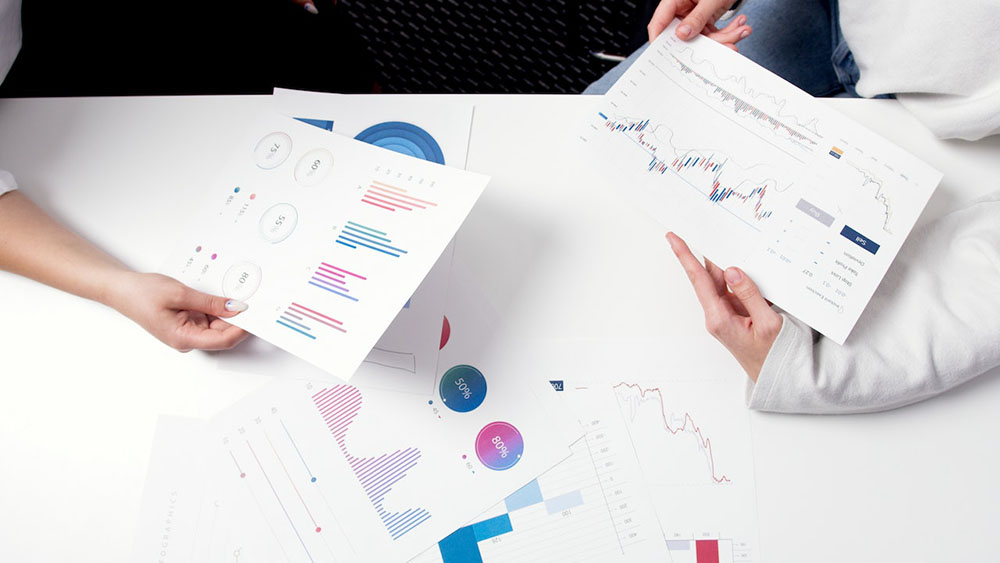When faced with a major decision, how do business leaders know which path to choose? How do companies gain insights into their past performance and make predictions about the future? The answer — business intelligence (BI) analytics.
BI analytics, is the process of applying quantitative methods to data in order to make more informed business decisions. Through business analytics, companies analyze and transform their raw data into information helping them stay competitive and achieve their goals.
Types of BI Analytics
There’s more than one type of BI analytics. Each type can offer different insights into your data and help inform your business decision-making in different ways. The four main types of analytics you may want to use in your business are:
Descriptive
Descriptive analytics is arguably the simplest of these four types of analytics. This type of analysis seeks to explain what happened in the past. For example, descriptive analytics might tell you your average sales volume over a certain period or the percentage of customers who make repeat purchases. You can use descriptive analytics to better understand your raw historical data and explain it to managers, shareholders, and investors.
Diagnostic
Diagnostic analytics take this a step further to explain why something happened. You can use this type of analysis to find the root cause of past events or the factors that contributed to specific outcomes. If you wanted to understand why your sales increased or decreased over the last year, for instance, diagnostic analytics could help you do so.
The key limitation of diagnostic analytics, though, is that it’s still only focused on the past. You may struggle to apply your findings from diagnostic analysis toward future decision-making.
Predictive
That’s where predictive analytics comes into play. Predictive analytics is used to predict future events and outcomes. This type of analysis forecasts the probability that certain events will occur in the future. Predictive analytics won’t tell you for certain whether a certain event will take place, but it can help you gauge the likelihood of certain outcomes.
These models use existing data to extrapolate and predict future data. They can be incredibly useful for developing sales and marketing forecasts, among other business applications.
Prescriptive
Prescriptive analytics goes beyond all three of the previously mentioned types of BI analytics to suggest future solutions. If you’re hoping to achieve a particular outcome in the future, prescriptive analytics can suggest various courses of action that can help you reach that goal. Prescriptive analytics is the answer to the question “what’s next?”. Basically, it’s the most in-demand form of analytics in business today. Fact is, you still need skilled employees and the right tools to implement it.
Why Are BI Analytics Important?
More and more companies all over the world are adopting business analytics. According to a study from MicroStrategy, 60% of companies worldwide use business analytics to improve their efficiency, 57% for improving decision-making, and 52% for achieving better financial performance. So why are so many businesses turning to BI analytics?
Business analytics is so important and valuable because allows organizations to get the most out of their data. Through business analytics, business leaders are better equipped to use their data to solve problems, make strong decisions, and prepare for the future.
Applications of BI Analytics Across Industries
Companies across industries use BI analytics to solve business problems and improve performance. Some notable applications of business analytics include:
Finance
In the financial sector, companies apply business analytics in several key ways to limit risk and forecast cash flows. They analyze financial data to find trends in a company’s own performance and trends in the broader markets.
Take a bank, for example. As more users turn to digital banking, traditional banks need to find ways to keep up with this digital transformation. Furthermore, business leaders within a bank could use prescriptive analytics to decide how they will meet the growing consumer demand for digital banking services.
Marketing
Effective marketing is key to a company’s success. Luckily, business analytics can help marketers improve their efforts and yield better results. By using BI analytics in marketing, companies can determine which marketing campaigns are most effective, which channels offer the highest returns on investment (ROI), and what social media strategies might work best. These are just a few examples of the way business analytics can elevate a company’s marketing efforts.
Cyber Security and Fraud Detection
Cyber attacks and data breaches are only growing each year. Companies need tools to protect themselves in this evolving threat landscape, and business analytics can offer a solution. BI analytics tools can consistently monitor and analyze your company data to identify and even predict costly attacks. Use business analytics to gain insights into the threats that might compromise your digital assets.
Insurance companies, in particular, can benefit from using business analytics to identify and mitigate fraud — saving them from the high costs of insurance fraud.
Human Resources
Human resource departments have the difficult and often overlooked task of finding ideal candidates for their companies and successfully on boarding them. Business analytics can play a key role in facilitating this process if applied correctly. HR leaders can apply BI analytics to sort through candidate data like average length of employment, educational background, and years of experience to speed up the hiring process.
The average cost of recruitment per new hire in the United States is $4,700, and business analytics can help companies lower that number. Additionally, this analysis can even forecast the best fit between certain candidates and the company or departments within the company.
Apply BI Analytics in Your Enterprise
If you’re interested in using BI analytics to gain unique insights and improve decision-making, Live Earth can help. Live Earth’s AI-powered data analytics platform helps you detect patterns, understand the ‘how’ and ‘why’, and make better-informed decisions across the board in your enterprise. Schedule your custom demo to see the power of the Live Earth platform in action.

